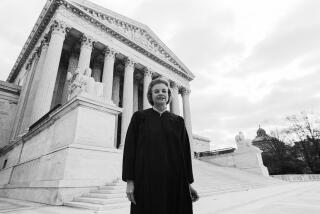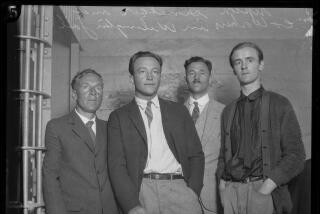John J. Sirica, Watergate Case Judge, Dies at 88
- Share via
WASHINGTON — Retired federal Judge John J. Sirica, the skeptical, activist jurist whose probing questions and tough legal tactics helped uncover the Watergate scandal of the Richard M. Nixon Administration, died Friday of cardiac arrest in Washington. He was 88.
Sirica died at Georgetown University Medical Center, hospital spokeswoman Sandra Hvidsten said. She had no further details of the judge’s illness. He was admitted to the hospital Tuesday for unspecified tests.
From humble beginnings as the son of an immigrant Italian barber, Sirica came to symbolize the rule of law as the Watergate conspiracy unfolded from 1972 to 1974, meting out stern sentences to most of the 42 people who were convicted or pleaded guilty during the scandal.
Almost single-handedly, Sirica presided over a series of pleadings, hearings and trials that started with the conviction of the original Watergate burglars in January, 1973, and culminated two years later with the convictions of former Atty. Gen. John N. Mitchell and top Nixon aides John D. Ehrlichman and H. R. Haldeman on charges of perjury, conspiracy and obstruction of justice.
It was Sirica’s relentless questioning of witnesses at the burglary trial, and later his subpoena of White House tape recordings, that laid the groundwork for investigations by Watergate special prosecutors, the Senate Watergate Committee and the House Judiciary Committee--and, in August, 1974, led to the first resignation of a U.S. President.
“Don’t pull any punches--you give me straight answers,” he told four Miami defendants when they pleaded guilty to burglary. He interjected questions for others who testified at the trial of chief Watergate burglars G. Gordon Liddy and James W. McCord Jr. And, after imposing maximum sentences on Liddy and McCord, he held open the possibility of future leniency if they cooperated further with prosecutors.
Although Liddy maintained a stony silence, McCord wrote a lengthy letter in March, 1973, about the involvement of high officials in Watergate planning--a statement that Sirica made public in court. This evidence helped form the basis for an inquiry and televised hearings by the Senate’s special Watergate panel, which was headed by the late Sen. Sam Ervin (D-N. C.).
The American Civil Liberties Union and some leading legal scholars, including Monroe Freedman, dean of the Hofstra University School of Law, sharply criticized Sirica’s tactics as violating the neutrality of the judicial branch of government. “Sirica deserves to be censured for becoming the prosecutor himself,” Freedman said.
To that charge, Sirica calmly replied: “I don’t think we should sit up here like nincompoops. The function of a trial court is to search for the truth.”
In 1974, Sirica brought the investigation to another historic juncture by turning over to the House Judiciary Committee a sealed envelope of evidence compiled against Nixon by the Watergate grand jury. Nixon resigned a few months later, after the committee voted to approve three articles of impeachment.
One former Nixon aide implicated in the scandal on Friday praised Sirica for his fairness and sensitivity.
“I think he was a great judge,” said the Rev. Jeb Magruder, who was sentenced to four years in prison and became a Presbyterian minister after his release. “He was the one who broke Watergate, and he was a tremendously bright but sensitive person.
“And even though I was a guilty party in all that, I felt he treated me fairly. You can’t ask anything else of a judge but fairness,” Magruder told the Associated Press.
Despite his reputation for stiff sentences--his nickname was “Maximum John”--Sirica often said that criminal sentencing was the most unpleasant part of his job. He would often be unable to sleep the night before a sentencing and once said: “I hate to look at the faces of the wives or children of these defendants.”
Never regarded as an intellectual, Sirica was reversed by appeals courts more than any other judge in the District of Columbia before the Watergate scandal. But it never seemed to bother him, and appellate judges were almost unanimous in their praise of his judicial conduct during the Watergate investigation.
Sirica reduced his caseload after recovering from a heart attack in 1976, although he maintained a steady stream of speaking engagements across the country. While at home, his regimen included riding a stationary bicycle in his basement for the equivalent of 10 miles each morning. He announced his retirement from the court as of October, 1986.
Behind his fearsome looks--heavy eyebrows and a squarely set jaw--Sirica could be a gentle, self-effacing man in a rumpled blue sport coat who would stop, unrecognized, to chat with tourists on lunchtime walks near the U. S. Courthouse.
Once a family from Iowa asked him to take their picture. As Sirica backed up to focus the camera, the father recognized him. “Well, then of course they insisted that I get in the picture,” Sirica said.
Proud of his humble upbringing, Sirica often told groups of students, whom he was fond of addressing in recent years: “If I can make it, anybody can.”
When he was a child, his family moved from Ohio to California to Virginia to Florida and, finally, to Washington as his father searched for work.
“It was an uphill fight against poverty,” he recalled in an interview with The Times several years ago. He helped support the family by greasing cars, waiting on tables and selling newspapers.
Once Sirica and a companion, running behind in their work, skipped greasing a car but charged the owner for a grease job anyway. The boss discovered the lie and confronted them in the presence of the customer.
Sirica, then 15, broke into tears. He remembered all his life “that awful feeling of shame when you’ve been dishonest.”
Never having attended college, Sirica tried law school at age 17 but twice dropped out because he found it too difficult. Not one to give up easily, he reapplied and stuck it out, earning his law degree in 1926 from Georgetown University.
To finance his education, he worked part time as a boxing coach for the Knights of Columbus and became a sparring partner for Jack Britton, a former welterweight champion.
Sirica fought a few “smoker” bouts without telling his mother, Rose, who was opposed to his entering the ring. But he eventually gave in to pride, showing his mother a newspaper clipping that referred to him as a “great little mitt artist” (he stood 5 feet, 6 inches tall).
He was also befriended by heavyweight boxing champion Jack Dempsey, and the two remained close in later life. Dempsey, who was best man at Sirica’s wedding in 1952, said of the judge during the Watergate years: “He’s a better fighter now than he ever was.”
After law school, Sirica gave up boxing and soon got a job as an assistant U. S. attorney for the District of Columbia. He set up a private law practice a few years later but it was not successful.
“I drank a lot of coffee in those days,” he told The Times. “I just sat there waiting for the phone to ring but I never got many clients. Other attorneys occasionally would refer criminal cases to me and I got some court-appointed criminal defense work--bank robbers and the like.
“But I guess my heart was never in defense work. Out of 42 cases, I lost 41 of them. I suppose I was a natural-born prosecutor.”
Sirica was rescued, in a sense, by his love for politics. He worked for a time as a Republican aide on Capitol Hill and in 1957 was appointed a federal judge by President Dwight D. Eisenhower.
Sirica’s tenure on the bench was largely undistinguished until, as chief judge, he assigned himself the Watergate burglary case after seven men involved in the break-in at Democratic national headquarters were indicted in September, 1972. He said he suspected from the beginning that there was more to the case than was apparent.
Reflecting on Watergate in an interview several years ago, Sirica told The Times: “The American people will not tolerate lying. Never lie to the American people. They can forgive almost anything except lying.
“What did you have in Watergate except a lot of lying by a lot of people, a lot of public officials, who should have known better?”
Sirica went on to say that “one of the most important lessons from Watergate is, when it appears there’s a political scandal, instead of covering it up or dragging it out, you’ve got to bring it out into the open right away. I think our legislators and public officials have learned that.”
The judge said the encouraging side of Watergate was how well the constitutional system of government worked.
“Haven’t we got a beautiful system to come through this on all fours, so to speak?” he said. “Watergate showed that the system worked just the way the Founding Fathers hoped it would.”
Nevertheless, in his memoirs, which he wrote in 1979 under the title “To Set the Record Straight,” Sirica said he regretted that Nixon had been allowed to resign without prosecution and that he was pardoned by President Gerald R. Ford.
Nixon “should have been indicted” for alleged Watergate crimes, Sirica said, and should have gone to trial--”no matter how long it took.”
“I take this view not because I would wish any more suffering on Nixon or his family but because I feel it would have been better for the country if the legal process had been allowed to run its course--either to acquit the former President or to find him guilty,” he wrote.
Sirica said he strongly believed that Nixon would have been convicted of obstructing justice in the Watergate investigation by trying to impede the FBI’s work, by concealing evidence and by encouraging officials to lie under oath. And he added:
“If he had been convicted in my court, I would have sent him to jail.”
Sirica is survived by his wife, Lucile, and three children--John Jr., Patricia Kane and Eileen Cardillo--and five grandchildren.
Funeral arrangements were pending.
More to Read
Sign up for Essential California
The most important California stories and recommendations in your inbox every morning.
You may occasionally receive promotional content from the Los Angeles Times.













